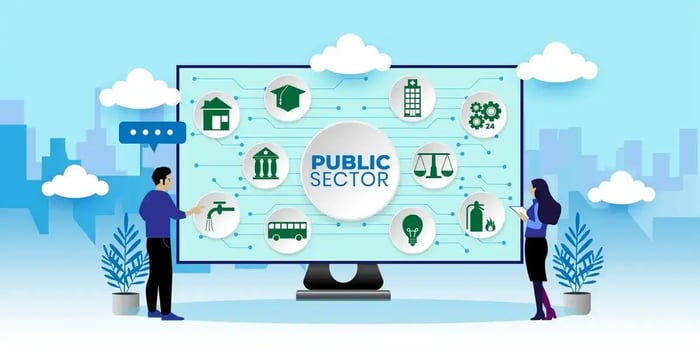Table of Contents
- Why Remote Project Management Certifications Matter? 📌
- 📋 Top Certifications for Remote Work & Virtual Teams
- 🎯 Benefits of Remote Project Management Certifications
- Public vs. Private Sector Remote Project Management
- How to Choose the Right Certification 🤔
- Key Challenges of Managing Remote Project Management Certifications Teams
- Success Stories: Certified Remote Project Managers in Action
- Future Trends in Remote Project Management Certifications
- 10 Lesser-Known Facts on Remote Project Management Certifications
- Final Thoughts
- FAQs
The shift to remote work has transformed how businesses manage projects. Project managers now require specialized skills to lead virtual teams efficiently. The right project management certification can provide expertise in communication, collaboration, and digital tools necessary for managing distributed teams. This blog explores the top remote project management certifications for work and virtual teams and their benefits.

Why Remote Project Management Certifications Matter? 📌
Managing projects remotely presents unique challenges, such as communication gaps, cultural differences, and time zone coordination. A certification in remote project management helps professionals:
✅ Improve virtual collaboration strategies
✅ Master remote project management tools
✅ Enhance agile and hybrid methodologies for virtual teams
✅ Develop strong communication and leadership skills
By obtaining these certifications, project managers can boost their credibility and increase their career prospects in the evolving job market.
📋 Top Certifications for Remote Work & Virtual Teams
With the rise of remote work, project managers need certifications that emphasize digital collaboration, communication, and virtual team leadership. The following certifications are highly valued for remote project management:
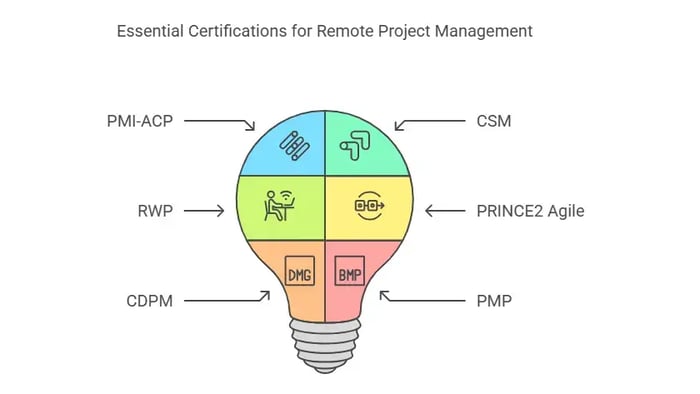
1. PMI Agile Certified Practitioner (PMI-ACP)®
Offered by: Project Management Institute (PMI)
Best for: Agile project managers handling remote teams
This certification focuses on Agile principles and frameworks, including Scrum, Kanban, and Lean, making it ideal for remote collaboration.
2. Certified ScrumMaster (CSM)®
Offered by: Scrum Alliance
Best for: Scrum masters managing distributed teams
The CSM certification equips project managers with Agile methodologies that improve efficiency in virtual team settings.
3. Remote Work Professional (RWP)™
Offered by: Remote Work Association
Best for: Managers transitioning to fully remote work
This certification provides strategies to overcome remote work challenges, optimize workflows, and enhance virtual communication.
4. PRINCE2 Agile® Certification
Offered by: AXELOS
Best for: Project managers seeking a hybrid approach
PRINCE2 Agile combines traditional project management principles with Agile flexibility, making it suitable for remote environments.
5. Certified Digital Project Manager (CDPM)®
Offered by: Digital Project Manager
Best for: Digital and IT project managers
CDPM focuses on digital-first project management, ensuring seamless coordination across online platforms.
6. PMP® (Project Management Professional)
Offered by: Project Management Institute (PMI)
Best for: Senior project managers
PMP covers risk management, stakeholder engagement, and leadership, which are crucial for handling virtual teams effectively.
If you're unsure whether to pursue PMP or PRINCE2, read this detailed comparison.
🎯 Benefits of Remote Project Management Certifications
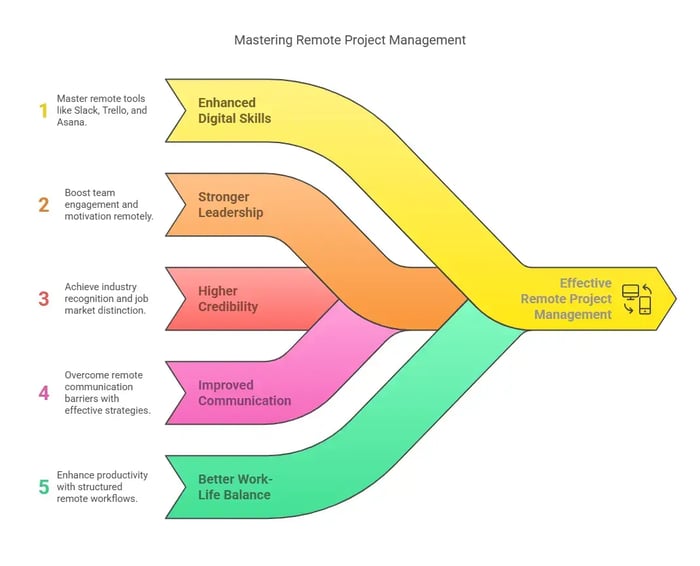
📌 Enhanced Digital Skills – Learn to use remote collaboration tools like Slack, Trello, and Asana.
📌 Stronger Leadership – Improve team engagement and motivation from a distance.
📌 Higher Credibility – Gain industry recognition and stand out in the job market.
📌 Improved Communication – Develop strategies to overcome remote communication barriers.
📌 Better Work-Life Balance – Implement structured workflows that enhance productivity in a remote setting.
Public vs. Private Sector Remote Project Management
While private-sector remote teams often focus on agility and rapid execution, public-sector remote project management involves additional compliance, security protocols, and policy-driven decision-making. Certifications like PRINCE2 Agile® or PMP® can bridge these gaps effectively.
Pro Tip: For professionals managing government and nonprofit projects, exploring public sector project management can provide valuable insights into sector-specific challenges and best practices.
How to Choose the Right Certification 🤔
Consider these factors when selecting a certification:
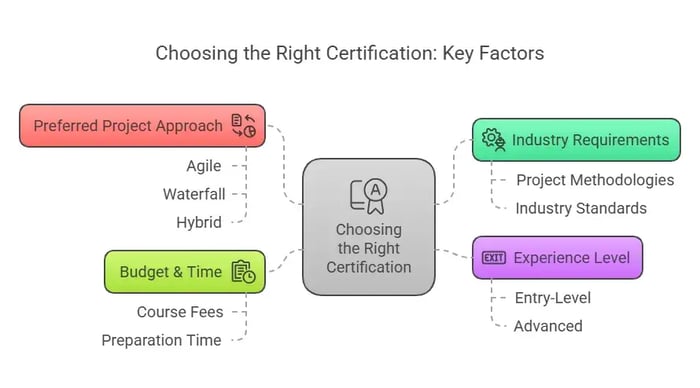
📍 Industry requirements – Choose based on your industry’s project methodologies.
📍 Experience level – Some certifications require prior experience.
📍 Preferred project approach – Agile, Waterfall, or Hybrid?
📍 Budget & time – Check course fees and preparation time needed.
Key Challenges of Managing Remote Project Management Certifications Teams
Managing remote teams presents unique challenges that require innovative solutions. One of the primary obstacles is communication barriers, as virtual teams rely heavily on digital tools instead of in-person interactions. Miscommunication and a lack of clarity can lead to project delays.
Another challenge is time zone differences, making it difficult to schedule real-time meetings or ensure immediate responses. Remote managers must adopt asynchronous communication methods and use collaboration tools effectively.
Productivity tracking is also a concern, as managers cannot directly observe team members. Setting clear expectations, tracking key performance indicators (KPIs), and using time management software help address this issue.
Finally, team engagement and motivation can suffer in a remote setting. Without office interactions, employees may feel isolated. Virtual team-building activities and regular check-ins help maintain morale and a sense of community.
Success Stories: Certified Remote Project Managers in Action
Real-world examples can highlight the impact of project management certifications in remote settings.
✅ Case Study 1: From Freelancer to Remote Team Lead
A marketing project manager who completed the Certified Remote Work Leader (CRWL) transitioned from freelancing to leading a globally distributed team. The certification helped her master time zone coordination and remote workflow optimization.
✅ Case Study 2: IT Manager Adopts Agile for Remote Development
An IT project manager pursued the PMI-ACP certification to enhance his ability to manage remote software development teams. This training helped streamline virtual stand-ups, sprint planning, and backlog grooming.
✅ Case Study 3: Scaling a Virtual Startup with PMP
A startup co-founder obtained the PMP certification to formalize project workflows in a remote-first company. The result? Increased efficiency, better stakeholder communication, and structured execution.
Future Trends in Remote Project Management Certifications
As remote work becomes the new normal, project management certifications are evolving to keep pace with industry needs. Here are some emerging trends:
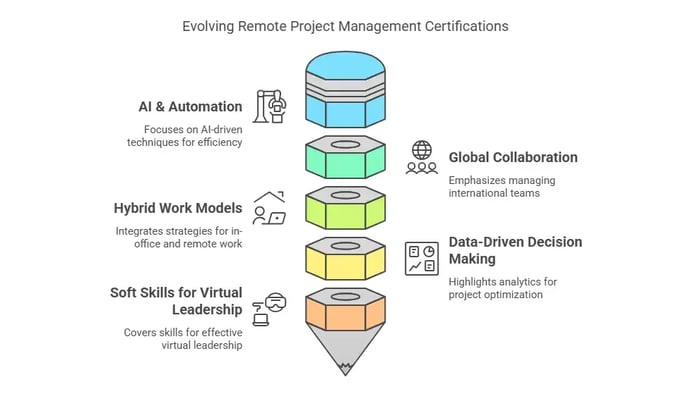
🚀 AI & Automation in Project Management – Certifications are now including AI-driven project management techniques, focusing on automation for scheduling, reporting, and risk assessment.
🌎 Global & Cross-Cultural Collaboration – Future certifications will emphasize managing international teams, ensuring inclusivity, and fostering cultural competence.
📈 Hybrid Work Models – More training programs will integrate hybrid team management strategies, helping professionals balance in-office and remote work environments.
🔍 Data-Driven Decision Making – Remote project management certifications will increasingly focus on analytics and data-driven decision-making to optimize virtual project execution.
💡 Soft Skills for Virtual Leadership – Certifications will expand to cover conflict resolution, virtual engagement strategies, and digital leadership skills.
10 Lesser-Known Facts on Remote Project Management Certifications
Emergence of Specialized Certifications: Beyond traditional certifications like PMP, there are specialized programs designed for remote project management.
Focus on Work-Life Balance: Some certifications emphasize achieving a healthier work-life balance for remote professionals. Healthy Work-Life Space
Integration of Agile Methodologies: Certifications are increasingly incorporating Agile practices to enhance flexibility in remote project management. Home - The Agile Coach
Leadership in Virtual Settings: Programs now focus on developing leadership skills specifically for managing virtual teams. Project Management Institute
Technological Proficiency: Modern certifications require proficiency in digital tools essential for remote collaboration. Harvard Online
Emphasis on Communication Skills: Effective communication is crucial in virtual settings, and certifications are adapting to address this need. Harvard Business School Online
Global Collaboration Focus: Certifications are evolving to prepare professionals for managing international virtual teams. American Public University
Recognition of Lesser-Known Certifications: Alternative certifications are gaining recognition for their relevance to remote work dynamics.
Adaptation to Remote Work Trends: Certifications are evolving to address the unique challenges of remote project management. Forbes
Availability of Remote Work Certifications: Certifications tailored specifically for remote work are now available.
Final Thoughts
The right project management certification can boost your skills and career opportunities in a remote setting. Whether you choose Agile, PMP, or digital project management certifications, staying updated with the latest methodologies will help you lead virtual teams effectively. 🚀
💡 Ready to take the next step? Explore more project management resources at APMIC.
FAQs
Which certification is best for remote project managers?
The PMI-ACP® and Certified Digital Project Manager (CDPM)® are among the top choices for remote project managers.
Do remote project managers need Agile certifications?
Yes! Agile methodologies enhance adaptability, crucial for managing remote teams.
What is the cost of project management certifications?
Costs range from $300 to $3,000, depending on the certification and training provider.
How long does it take to complete a remote project management certification?
Most certifications take 3 to 6 months, though self-paced courses may vary.
Are there free certifications for remote project management?
Some platforms, like Coursera and LinkedIn Learning, offer free introductory courses.
What industries benefit most from remote project management certifications?
Tech, healthcare, finance, and consulting sectors benefit greatly from remote project management skills.
Is PMP certification relevant for remote teams?
Yes, PMP covers leadership, communication, and risk management, all essential for remote projects.
What are the challenges of remote project management?
Time zones, cultural differences, communication gaps, and tech issues are common hurdles.




